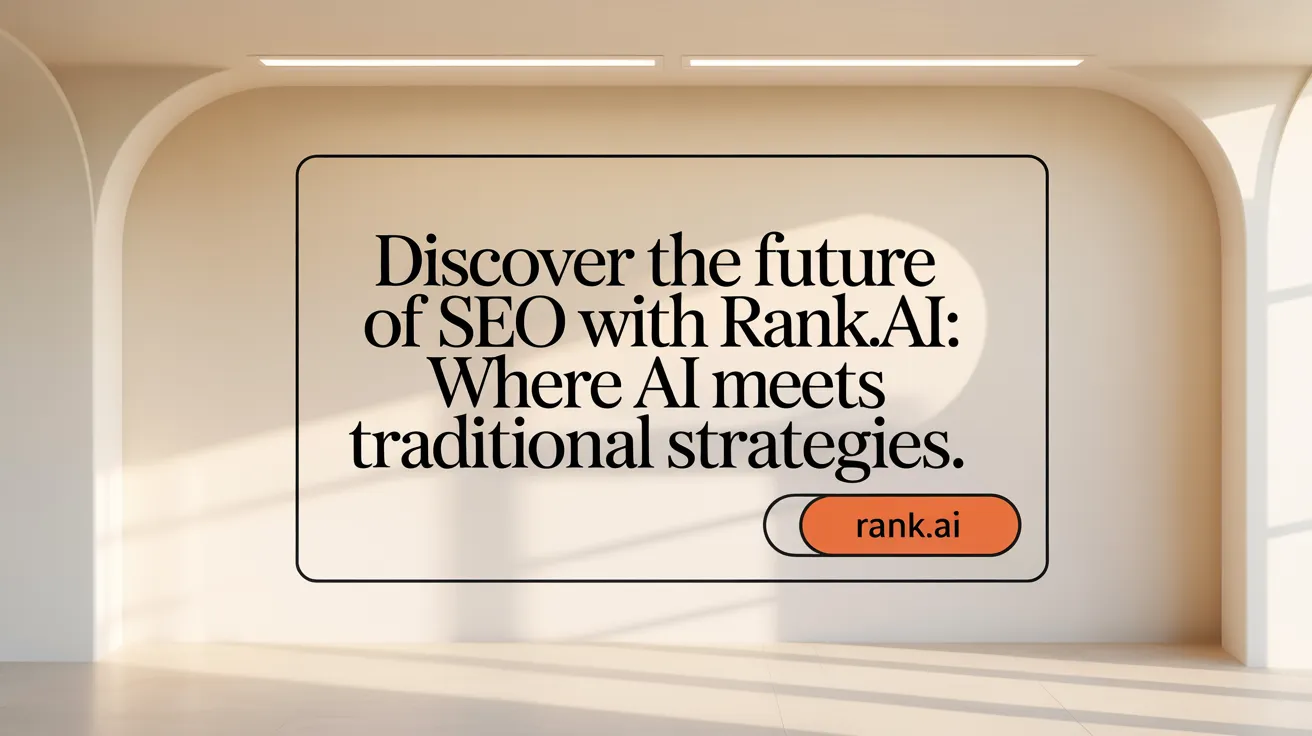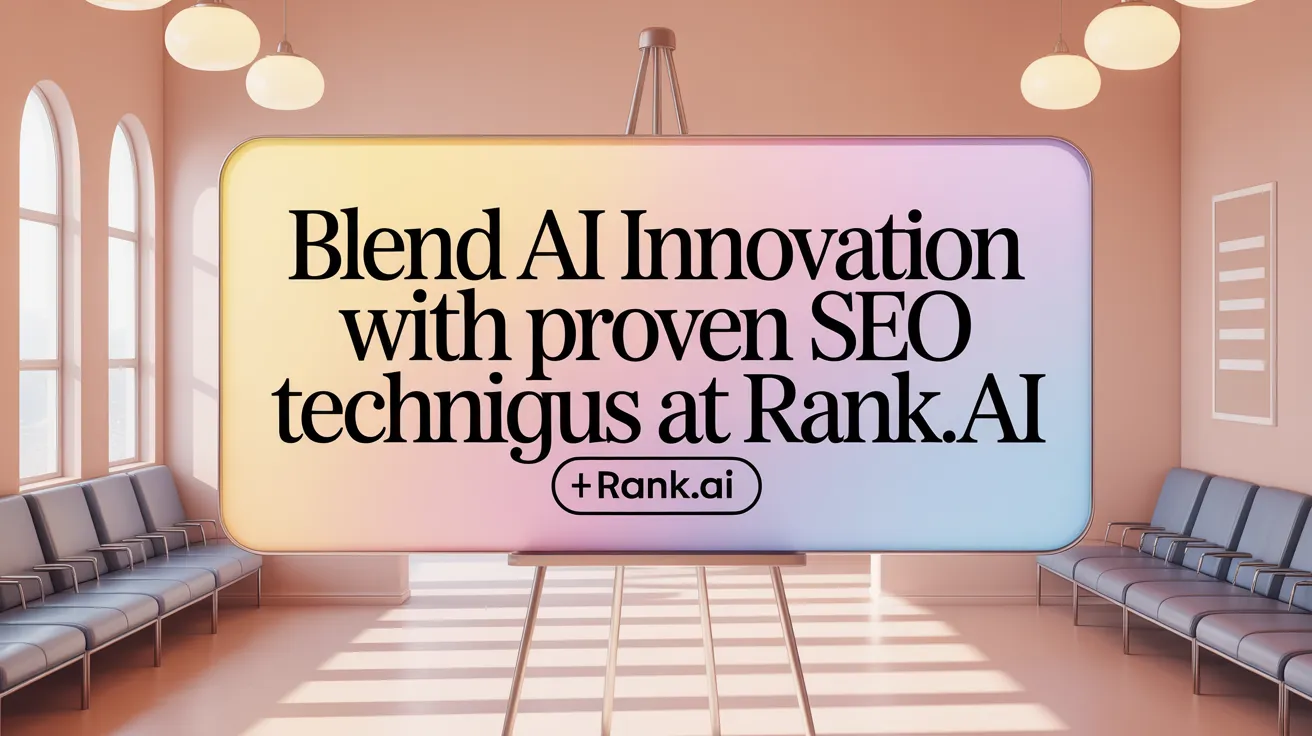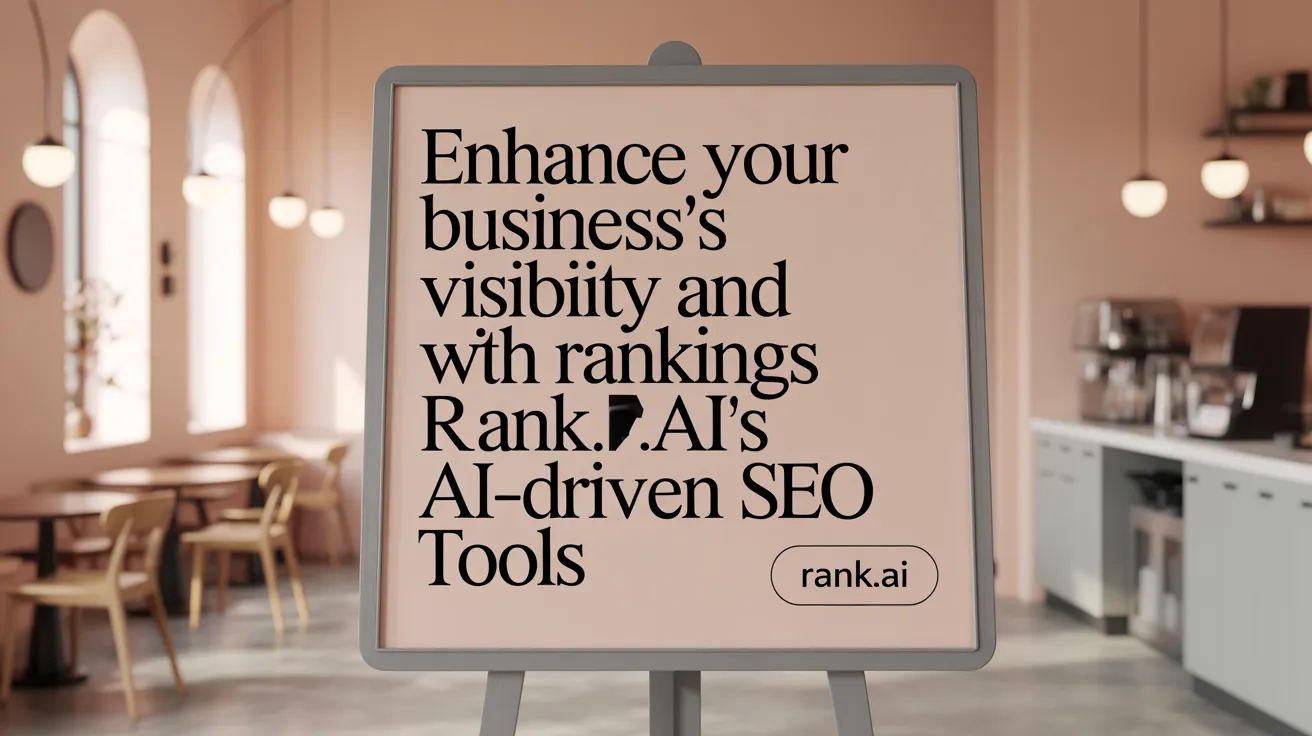Utilizing AI to Craft Winning SEO Campaigns and Strategies
Harnessing Artificial Intelligence for SEO Success

Revolutionizing SEO Through AI Integration
As digital landscapes evolve, artificial intelligence (AI) has become a vital driver in crafting effective SEO campaigns and strategies. AI-powered platforms like Rank.ai are reshaping how businesses approach keyword research, content creation, and technical optimization, enabling unprecedented efficiency and precision. This article explores the methods, benefits, and future trends of integrating AI into SEO, providing a roadmap for businesses aiming to boost their online visibility and engagement in 2025 and beyond.
Introducing Rank.ai: A Fusion of AI and Traditional SEO

What is Rank.ai and what services does it offer?
Rank.ai is an innovative AI-powered SEO platform and digital marketing agency focused on boosting online visibility for businesses of all sizes. The platform combines advanced artificial intelligence techniques with established SEO practices, creating a comprehensive solution for optimizing websites and digital content.
It offers a suite of services including automated keyword research, AI-driven content creation, technical SEO audits, and real-time website optimization. By integrating AI tools that analyze search engine rankings and assess competitor strategies, Rank.ai helps marketers craft more effective SEO campaigns. The platform aligns with Google's E-E-A-T principles, emphasizing Experience, Expertise, Authority, and Trustworthiness to enhance search results relevance.
Rank.ai’s technology utilizes complex AI models, similar to large language models, to interpret vast data and drive actionable insights. These models support the identification of high-value keywords, content gaps, and backlink opportunities, enabling businesses to improve their rankings and attract organic traffic more efficiently.
Designed for a diverse range of industries and business scales, Rank.ai supports small enterprises as well as large corporations. Its user-friendly interface and customizable subscription plans allow users to automate routine SEO tasks while maintaining strategic control. This fusion of AI capabilities and traditional SEO expertise positions Rank.ai as a competitive player alongside platforms like Semrush, Search Atlas, and Writesonic, empowering users to accelerate their digital marketing success in an increasingly AI-driven landscape.
The Integration of AI and Traditional SEO Techniques at Rank.ai

How does Rank.ai integrate AI technology with traditional SEO methods?
Rank.ai combines AI technology with traditional SEO tasks by employing advanced AI-powered capabilities like machine learning and natural language processing (NLP). This integration automates and enhances essential SEO functions such as keyword research, content creation, and technical site analysis. AI accelerates the processing of expansive datasets to generate real-time insights, uncover trends, and deliver predictive analytics in SEO.
The platform supplements AI-driven data with human expertise in areas such as backlink acquisition and on-page SEO refinement, creating a balanced, scalable approach. This synergy allows Rank.ai to produce high-quality SEO-rich content rapidly, supporting improved search engine rankings.
Furthermore, Rank.ai leverages AI to address emerging search modalities, including voice search optimization and visual search optimization. These efforts ensure websites optimize for evolving algorithms and modern user intents. By fusing AI advancements with traditional SEO practices, Rank.ai fosters personalized, relevant, and authoritative content that heightens online visibility and user engagement.
Throughout this process, ethical AI use in SEO and human oversight remain crucial in guiding AI outputs, preserving content originality, brand voice, and maintaining accuracy.
Business Benefits of Leveraging Rank.ai for SEO Enhancement

What are the benefits of using Rank.ai for businesses seeking to improve their online visibility?
Rank.ai offers robust advantages by integrating AI technology with traditional SEO methods to streamline and enhance business online visibility.
It significantly improves efficiency in content creation and optimization. Businesses can automate keyword research, SEO mapping, and content brief generation, cutting down production time by up to 75%. This automation allows SEO teams to focus more on strategic creativity rather than repetitive manual tasks.
Rank.ai provides real-time trend monitoring and competitor intelligence. By continuously analyzing changes in search intent and content gaps, it enables businesses to quickly adapt and capture emerging ranking opportunities before competitors.
The tool conducts comprehensive technical SEO audits to identify and resolve issues like site speed, crawlability, and meta tag optimization. This ensures websites maintain technical health and provide smooth user experiences, which are crucial for ranking well.
These combined capabilities impact search rankings positively by improving keyword targeting, content relevance, and site authority. Rank.ai’s data-driven insights empower businesses to sustain organic traffic growth while adopting a proactive SEO strategy that stays aligned with evolving search engine algorithms.
Versatility of Rank.ai Across Business Sizes and Industries

Can Rank.ai's platform be used by businesses of all sizes and industries?
Yes, Rank.ai's platform is highly versatile and can be effectively used by businesses ranging from small startups to large enterprises. Its design accommodates a wide variety of marketing, sales, and operational requirements, making it adaptable for numerous industries.
Smaller businesses benefit from Rank.ai by gaining access to AI-powered SEO tools that automate and optimize digital marketing efforts, providing competitive advantages even with limited resources. On the other hand, larger enterprises integrate Rank.ai’s advanced features to streamline expansive SEO campaigns across multiple regions and languages, enhancing visibility and performance at scale.
AI adoption trends highlight strong integration within technology companies and professional services sectors, though its influence spreads across retail, e-commerce, and B2B industries as well. This broad applicability ensures that Rank.ai meets the unique SEO and digital marketing challenges facing diverse market verticals.
Rank.ai's scalable architecture supports growing businesses by allowing seamless expansion of SEO operations, incorporating real-time data monitoring, content optimization, and competitive analysis. Its flexible platform continues to evolve, enabling organizations of any size to efficiently harness AI capabilities for growth and increased online visibility.
AI-Driven Keyword Research and Competitor Analysis
How Does AI Identify High-Value Keywords?
AI uses machine learning in SEO (ML) and natural language processing SEO (NLP) to analyze massive amounts of search data. This helps discover high-value keywords by understanding not just literal terms but the intent behind user queries. AI spots emerging topics and gaps in the market that humans might miss.
What Role Do Long-Tail Keywords and Semantic Relevance Play?
Long-tail keywords, often more specific and less competitive, are vital for attracting targeted traffic. AI automatically detects these by analyzing phrase patterns and user search behaviors. It also assesses semantic relevance in SEO, ensuring keywords align closely with the underlying meaning of search queries, enhancing content discoverability.
How Does AI Analyze the Competitive Landscape?
AI tools assess competitors by examining top-ranking pages for keywords, backlink profiles, content formats, and user engagement metrics. This competitor analysis in SEO reveals strengths and weaknesses, allowing marketers to strategize for optimal positioning.
How Can AI Enhance Content Alignment with Search Intent?
AI deciphers different intent types—informational, navigational, transactional—to recommend keywords and content structures aligned with funnel stages that best match what users seek. This alignment boosts content relevance, improving search rankings and conversion potential.
Integrating AI-driven insights into keyword research and competitor analysis powers smarter SEO strategies. By focusing on relevance, user intent, and competitor gaps, businesses can create content that resonates with audiences and outperforms rivals.
AI-Powered Content Creation and Optimization Strategies
Generating Topic Ideas, Content Briefs, and Outlines via AI
AI has become an essential tool for kick-starting the SEO content creation process. Platforms like ChatGPT for SEO Content Creation and specialized tools such as Conductor AI for Competitor Analysis assist marketers in researching competitor keywords, surfacing trending topics, and generating detailed content briefs. These briefs include key headings, FAQs, and relevant questions, providing a structured foundation that aligns well with search intent understanding and SEO content outlines.
Drafting SEO-Optimized Content Using AI Platforms
With outlines and briefs in place, AI-driven platforms such as Jasper AI content creation and ChatGPT for SEO help draft SEO-optimized content efficiently. These tools analyze vast datasets and keyword relevance to produce engaging, well-structured text optimized for search engines. Features include generating meta tags, titles, and incorporating semantic relevance in SEO elements for better content comprehensiveness and ranking potential.
Balancing AI Automation with Human Editing
While AI streamlines content creation, human oversight remains vital. Experts recommend reviewing AI-generated drafts to ensure accuracy, maintain brand voice, and align with authenticity and the company’s style. This blend ensures content adheres to Google's E-E-A-T principles (Experience, Expertise, Authority, Trustworthiness), which are critical for SEO success.
Continuous Content Performance Measurement and Updates
AI tools support ongoing content optimization by analyzing performance metrics such as organic traffic, engagement rates, and keyword ranking improvements. Professionals use this feedback to update or consolidate content regularly, keeping material relevant and authoritative. Tools like Google Analytics for SEO, Google Search Console usage, and AI-powered content optimization platforms facilitate this continuous improvement loop, helping websites maintain competitive SEO standings.
On-Page and Technical SEO Enhancements Powered by AI
How does AI improve metadata, headers, alt text, and schema markup?
AI-powered SEO tools for WordPress analyze webpage content to recommend optimized metadata—such as title tags and meta descriptions—that improve search engine visibility. They suggest appropriate headers for content clarity and hierarchy, ensuring that pages are structured logically. AI algorithms also generate descriptive alt text for images, enhancing accessibility and visual search performance. Additionally, AI facilitates the creation of schema markup, including FAQ and HowTo schemas, which help search engines better understand content and enable rich results. For more details, see the SEO Starter Guide.
In what ways does AI enhance page structure, readability, and URL organization?
AI evaluates readability metrics and keyword relevance across pages, recommending improvements to sentence flow, paragraph length, and keyword placement. It optimizes content layout for user engagement by structuring text into clear sections with bulleted lists and short paragraphs. Regarding URLs, AI suggests logical, descriptive, and clean URL structures aligned with site content, which assists both search engines and users in navigation. These approaches are covered in AI SEO Strategies and the SEO Starter Guide.
How does AI automate technical audits for SEO?
AI-driven platforms for SEO automation automatically scan websites to detect technical issues impacting SEO performance. These include site speed bottlenecks, mobile-friendliness problems, broken links, crawl errors, and missing or incorrect XML sitemaps. By flagging these issues early, AI tools enable timely fixes to maintain healthy site health and improve search rankings. For comprehensive strategies, refer to SEO Campaign Strategy 2025.
Why is aligning site architecture with UX and search engine needs important?
AI helps design and analyze website architecture to support intuitive navigation and a seamless user experience. It recommends internal linking benefits and website navigation improvement strategies that distribute page authority effectively, improving crawlability. Furthermore, AI ensures compliance with search engine indexing requirements by verifying resource accessibility such as CSS and JavaScript. Optimal site structure reduces bounce rates and enhances conversions by making content discoverable and accessible. Learn more about this at SEO strategy with AI integration.
By integrating AI into on-page and technical SEO, digital marketers gain powerful automation and insights that significantly elevate website performance within search engines and for visitors alike. For an overview of AI's transformative role, see AI and SEO transformation and How AI is transforming SEO.
AI and Link Building: Strategies for Authority and Credibility
Identifying Reputable Backlink Sources Through AI Analysis
AI tools excel at scanning vast amounts of data to identify websites that are reputable and relevant for earning backlinks. By analyzing metrics such as domain authority, traffic, and topical relevance, AI helps pinpoint high-quality link opportunities that align with a website’s niche. This ensures backlinks are valuable and positively influence search rankings. Learn more about backlink monitoring, and competitor backlink strategy.
Analyzing Competitor Backlink Profiles and Strategies
AI-powered platforms can dissect competitor backlink profiles with precision, revealing where their most effective backlinks originate. Understanding competitor link strategies—including the types of sites linking to them and their anchor text patterns—enables businesses to replicate and improve upon these approaches. This competitor insight fuels smarter outreach and content strategies. See details on competitor analysis in SEO, and competitor backlink analysis.
Optimizing Anchor Text and Link Distribution Using AI
Effectively optimizing anchor text ensures that backlinks carry strong SEO signals. AI analyzes existing backlink profiles to suggest optimal anchor text variations, balancing keyword-rich and natural phrasing. Additionally, AI aids in distributing links across pages strategically to enhance site architecture, distribute authority, and improve user navigation. Explore internal linking benefits, distributing authority via internal links, and AI internal linking.
Building High-Authority Links to Improve Domain Trust
High-authority backlinks are integral for establishing domain trust. AI helps target authoritative domains such as educational, governmental, or industry-leading sites. By automating identification and evaluation, AI streamlines the process of building these valuable links, resulting in improved search engine trustworthiness and ultimately better organic rankings. Review strategies on authoritative backlink identification, and earning relevant backlinks.
Overall, integrating AI in link building combines deep data analysis with tactical execution, boosting the effectiveness of acquiring links that enhance authority and credibility. For a comprehensive look at AI-powered SEO tools and link building, and AI-driven SEO strategies, consult the linked resources.
Utilizing AI Tools to Monitor and Measure SEO Performance
Tracking organic traffic, CTR, conversions, and engagement with AI metrics
AI-powered SEO platform enable real-time tracking of critical metrics like organic traffic, click-through rates (CTR), conversions, and user engagement. These insights help marketers understand how content performs and which areas generate higher interaction and revenue.
Integrating Google Search Console and Analytics with AI insights
Combining AI tools with Google Search Console and Google Analytics provides a comprehensive view of SEO performance. AI simplifies data analysis by uncovering patterns and trends that might be missed manually, and streamlines monitoring of keyword rankings, site health, and user behavior.
Measuring AI SEO success through chatbot query testing and snippet appearances
An emerging method to gauge AI SEO effectiveness is testing content visibility in AI-driven search results like chatbots (ChatGPT, Google AI Overviews). By querying relevant questions repeatedly and analyzing if your site’s content appears in AI snippets or summarized answers, marketers get a sense of AI visibility and brand prominence.
Data-driven adjustments for continuous campaign improvement
Using AI to continuously analyze performance data supports iterative improvements. Adjustments based on keyword performance, user engagement trends, and competitive changes allow campaigns to evolve dynamically. Automated alerts and recommendations from AI SEO tools keep SEO strategies agile and results-driven.
Emerging SEO Trends Shaped by AI Technology
How is AI influencing voice and visual search optimization?
AI-driven SEO increasingly focuses on voice search optimization and visual search optimization, leveraging natural language processing SEO and image recognition technologies. Voice search optimization involves tailoring content to conversational, long-tail queries and real-world questions, making it easier for AI to understand and match user intent. Visual search improvements use sophisticated image analysis to help users find products or information through photos, enhancing local SEO optimization with AI and user experience.
What role does predictive analytics play in adapting to algorithm changes?
Predictive analytics in SEO powered by AI helps SEO teams stay ahead by forecasting search engine algorithm updates and trending user behaviors. By analyzing vast historical data and identifying SEO data patterns, AI allows marketers to anticipate changes and adjust their SEO strategies proactively. This ensures SEO continuous optimization and sustained high rankings even as search engines evolve.
Why are ethical considerations and transparency important in AI SEO?
As AI becomes central to SEO, ethical AI use in SEO and transparency are critical to maintain trust and compliance. Marketers must address data privacy in AI marketing, algorithm bias issues, and clear disclosure of AI-generated content. Ethical AI use in SEO ensures fairness, protects user data, and upholds content integrity, avoiding deceptive practices and fostering a trustworthy relationship with both users and search engines.
How does AI personalize and dynamically recommend content?
AI-powered recommendation engines analyze individual user behavior and preferences to deliver personalized content experiences. This dynamic content tailoring improves engagement and conversion rates by suggesting relevant articles, videos, or products in real time. Personalization helps brands create more meaningful connections with their audience while boosting SEO effectiveness through higher user satisfaction.
Best Practices for Combining AI and Human Expertise in SEO
Supplement AI Content with Human Review for Accuracy and Brand Voice
While AI tools for SEO content creation can rapidly generate content and optimize keywords, human oversight is essential to ensure accuracy, relevance, and alignment with the brand's voice. Reviewing AI drafts helps eliminate errors and maintain authenticity, which protects brand reputation (AI-generated content and SEO, AI Content and SEO).
Avoid Overreliance on AI to Mitigate Risks
Excessive reliance on AI-generated content can lead to misinformation, lack of originality, and tonal inconsistencies. SEO professionals should use AI as a supplement rather than a replacement, balancing automation with critical human judgment to avoid biases and maintain content quality (Ethical AI use in SEO, AI Content and SEO.
Create Multi-Channel, Authentic Content Strategies
Effective SEO integrates AI efficiency with genuine storytelling across various channels. Combining AI's data-driven insights with human creativity promotes authenticity, builds trust, and better engages diverse audiences (Leveraging AI in Digital Marketing, AI and SEO transformation, AI for SEO).
Train Teams to Use AI Tools Alongside Manual SEO
Empowering teams with AI knowledge alongside traditional SEO skills fosters more strategic and productive workflows. Continuous training on AI tools alongside manual optimization techniques ensures the best use of AI while maintaining nuanced human control over SEO strategy development and execution (AI SEO tools and training, Effective SEO Strategy 2025, Using AI Tools for SEO Content).
Selecting and Leveraging AI SEO Tools for Comprehensive Campaigns
Overview of Top AI SEO Tools
Several AI-powered SEO tools stand out in the market for helping businesses optimize their online visibility. Notably, Rank.ai specializes in automating content creation and SEO audits, offering features such as real-time SEO scoring and semantic SEO insights. Semrush combines AI-driven keyword research with competitor analysis and on-page SEO optimization, supporting broad campaign management. Frase focuses on content creation and optimization by analyzing top SERPs and generating content outlines and drafts. Lastly, Jasper provides AI-assisted content generation with brand voice customization to streamline writing tasks.
Tool Functionalities
These tools cover multiple stages of the SEO process:
- Keyword Research: AI tools analyze vast datasets to identify high-value and long-tail keywords, leverage natural language processing for better search intent understanding, and suggest keywords with favorable competition metrics (AI keyword research techniques.
- Content Drafting: Platforms like Frase and Jasper generate outlines and AI-assisted drafts that improve efficiency and relevance while maintaining quality through human oversight (Using AI Tools for SEO Content.
- Technical Audits: Tools such as Rank.ai and Semrush conduct site audits to detect errors, optimize metadata, and enhance technical SEO factors like site speed and crawlability (SEO technical audits).
Cost Considerations and Scalability
AI SEO tools typically offer tiered subscription plans to accommodate differing business sizes—from small startups to large enterprises. Prices vary accordingly, with entry-level plans suitable for freelancers and small businesses, while advanced options include multi-language support, multi-brand tracking, and comprehensive analytics tailored for enterprises (Best AI SEO Tools In 2025).
Integrating Multiple AI Tools for a Cohesive Workflow
Combining AI tools enables marketers to harness specialized strengths from each platform, creating a seamless SEO workflow. For instance, using Semrush for keyword and competitor insights alongside Frase’s content drafting capabilities, and Rank.ai’s SEO auditing tools leads to comprehensive optimization. Integration with content management systems like WordPress further streamlines publishing and performance tracking (AI-powered SEO platform).
This strategy of combining specialized AI tools empowers businesses to stay competitive and agile in the evolving SEO landscape by automating repetitive tasks while supporting human creativity and strategic planning (AI for SEO overview.
Charting the Future of SEO With AI
The integration of AI technology into SEO campaigns is transforming how businesses optimize their online presence, making strategies more efficient, data-driven, and aligned with evolving search engine algorithms. Platforms like Rank.ai exemplify this shift by blending AI capabilities with traditional SEO methods, empowering businesses of all sizes to achieve superior search rankings and audience engagement. As AI continues to evolve, embracing ethical practices and human oversight alongside AI tools will be essential to crafting authentic, authoritative content. By adopting a holistic AI-enhanced SEO approach, marketers can navigate the complexities of digital search, innovate continuously, and secure lasting competitive advantages in the dynamic online landscape.
Table of contents
Recent articles
Fresh insights on AI and SEO to help you stay ahead of the curve.


Ready to Improve
Your Rankings?
Use our free tools to get instant insights into your SEO performance and discover opportunities to rank higher




